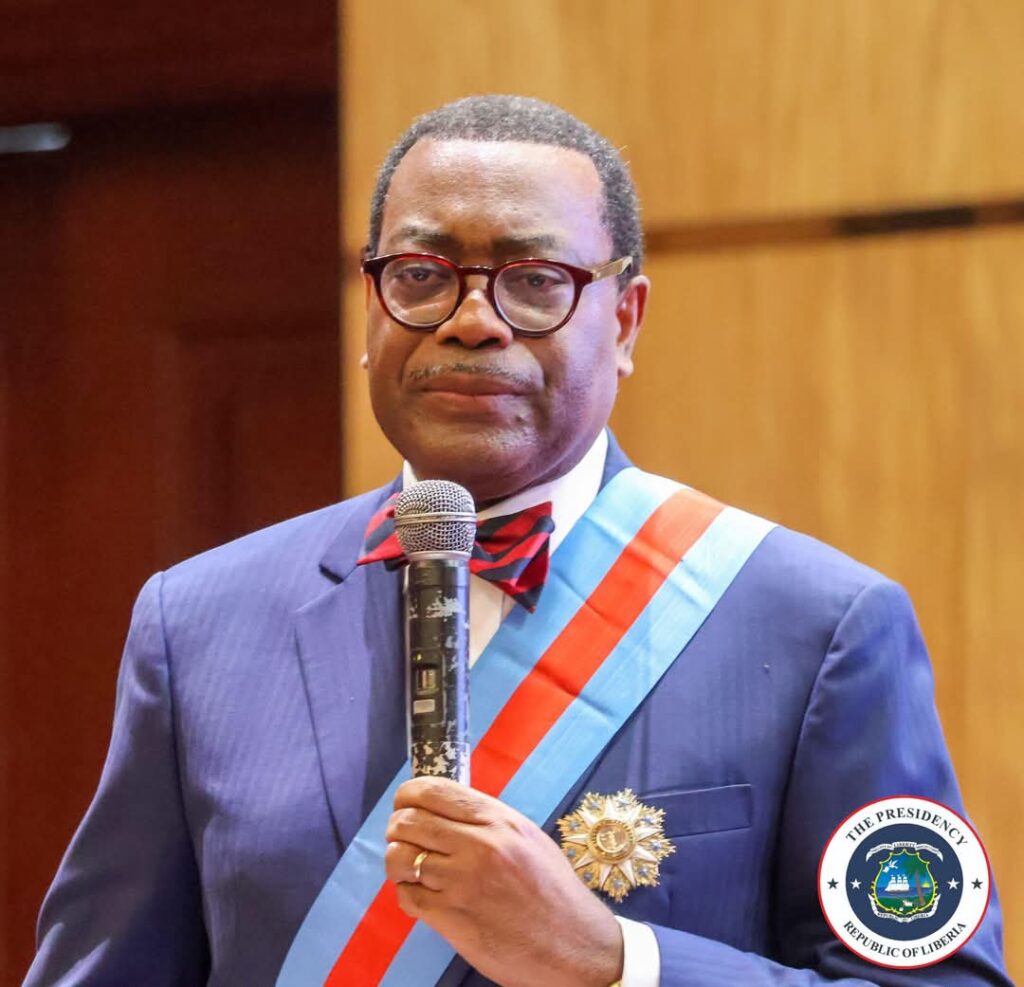During the official launch of the Youth Entrepreneurship Investment Bank (YEIB) in Liberia, Dr. Akinwumi Adesina, President of the African Development Bank (AfDB), called on President Joseph Nyuma Boakai to demand measurable results from his officials and hold them strictly accountable.
Dr. Adesina, speaking on the theme “Liberia, Arise and Shine” at the Ministerial Complex in Congo Town, laid out a detailed framework for transformational governance. He said for Liberia to realize its full development potential, the government must shift from business-as-usual to performance-driven leadership, grounded in responsibility, high standards, and team cohesion.
“Mr. President,” he said directly, “if Liberia must see transformational change, you must wear the jacket of restraint and take decisive actions. Demand results. Track them. And hold your officials accountable.”
He referenced the transformative experience of the AfDB under his leadership, explaining how the institution aligned its organizational structure with its “High 5” development priorities. Five Vice Presidencies were established, each tasked with leading one of the priorities, and a robust performance-monitoring framework was put in place. All staff, from vice presidents to professional officers, signed annual performance contracts, with key performance indicators tailored to measure impact across regions and departments.
“This meant we could rigorously measure the impact of our operations and ensure alignment and delivery at all levels,” he said.
Dr. Adesina emphasized that real change begins with a mindset shift—especially among ministers. Drawing from his own tenure as Nigeria’s Minister of Agriculture, he reminded government officials that they are not “mini-presidents” but rather appointees with a duty to deliver on the President’s mandate.
“Ministers have no excuse for underperformance,” he said firmly. “They must be speed trains—focused, determined, and relentless in achieving set goals.”
In a compelling personal anecdote, Dr. Adesina recounted how he set a bold target of producing 20 million tons of food in four years, an ambition that alarmed even the Nigerian Minister of Planning. When advised to scale down the target, he declined and told the Nigerian President: “If I don’t deliver, fire me.” The risk paid off. By the end of the term, his ministry had exceeded its goal by producing 21 million tons of food.
“People do not put you in a position of responsibility to do small things,” he said. “Set big goals. If your target is too realistic, you’re too comfortable.”
He then turned his focus to the importance of teamwork, saying that the success of President Boakai’s ARREST agenda would rely on collaborative, not isolated, government efforts.
He warned against the common tendency in government for ministries to operate in silos, driven by ego and competition.
“Forget about territories. Forget about who takes credit. Work together,” he urged. “Liberia’s challenges and opportunities are like Baobab trees—big, immovable, and impossible to grasp alone. But together, with collective effort, they can be tackled.”
Dr. Adesina introduced what he called the “Baobab Principle,” which underpinned many of his successes at AfDB. It was this philosophy, he said, that led to major partnerships such as the Mission 300 initiative with the World Bank to connect 300 million Africans to electricity by 2030 and the Feed Africa Summit, which raised $72 billion to combat food insecurity.
In line with this principle, he encouraged the Liberian government to introduce a Presidential Inter-Agency Performance Award to incentivize cross-agency collaboration. He said this model had helped foster a “One Bank Approach” at AfDB and urged Liberia to implement a similar “One Government Approach.”
“You get what you incentivize,” he concluded. “Turn cooperation into collaboration—and collaboration into partnerships that deliver impact for the Liberian people.”, he added


